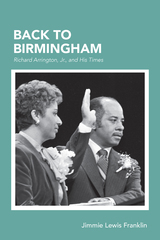
During the 1960s, Birmingham, Alabama was the central battleground in the struggle for human rights in the American South. As one of the most segregated cities in the United States, the city of Birmingham became infamous for its suppression of civil rights and for official and vigilante violence against its African American citizens, most notoriously the use of explosives in the Sixteenth Street Baptist Church bombing and the bombing of the home of Reverend Fred Shuttlesworth.
In October of 1979, Birmingham elected its first Black mayor, Richard Arrington Jr. He was born in the rural town of Livingston, Alabama. His family moved to Birmingham when he was a child. A man of quiet demeanor, he was nevertheless destined to bring to fruition many of the fundamental changes that the Civil Rights Movement had demanded. This is his story. Not a conventional political or Civil Rights history, Back to Birmingham is the story of a man who demonstrated faith in his region and people. The work illuminates Arrington's sense of place, a quality that enables a person to claim sentimentally a portion of the natural and human environment. Franklin passionately underscores the importance of the attachment of Southern Blacks to their land and place.
Back to Birmingham will appeal to both the general reader and the serious student of American society. The book endeavors to bridge the gap between popular and scholarly history. It is guided by the assumption that Americans of whatever description can find satisfaction in comprehending social change and that they are buoyed by the individual triumph of those who beat the odds.
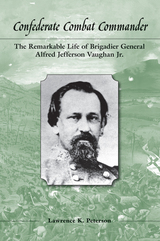
In Confederate Combat Commander, Lawrence K. Peterson explores the life of this unheralded yet important rebel officer before, during, and after his military service. A graduate of Virginia Military Institute, Vaughan initially commanded the Thirteenth Tennessee Infantry Regiment, and later Vaughan’s Brigade. He served in the hard-fought battles of the western area of operations in such key confrontations as Shiloh, Perryville, Stones River, Chickamauga, Chattanooga, and the Atlanta Campaign.
Tracing Vaughan’s progress through the war and describing his promotion to general after his commanding officer was mortally wounded, Peterson describes the rise and development of an exemplary military career, and a devoted fighting leader. Although Vaughan was beloved by his troops and roundly praised at the time—in fact, negative criticism of his orders, battlefield decisions, or personality cannot be found in official records, newspaper articles, or the diaries of his men—Vaughan nevertheless served in the much-maligned Army of Tennessee. This book thus assesses what responsibility—if any—Vaughan bore for Confederate failures in the West.
While biographies of top-ranking Civil War generals are common, the stories of lower-level senior officers such as Vaughan are seldom told. This volume provides rare insight into the regimental and brigade-level activities of Civil War commanders and their units, drawing on a rich array of privately held family histories, including two written by the general himself.
Lawrence K. Peterson, a retired airline pilot, worked as a National Park Service ranger and USAF officer. He is the great-great grandson of Brigadier General Alfred Jefferson Vaughan Jr.


CONTENTS
Introduction: What's Changed, What Hasn't, Thomas Biolsi & Larry J. Zimmerman
Part One--Deloria Writes Back
Vine Deloria, Jr., in American Historiography, Herbert T. Hoover
Growing Up on Deloria: The Impact of His Work on a New Generation of Anthropologists, Elizabeth S. Grobsmith
Educating an Anthro: The Influence of Vine Deloria, Jr., Murray L. Wax
Part Two--Archaeology and American Indians
Why Have Archaeologists Thought That the Real Indians Were Dead and What Can We Do about It?, Randall H. McGuire
Anthropology and Responses to the Reburial Issue, Larry J. Zimmerman
Part Three-Ethnography and Colonialism
Here Come the Anthros, Cecil King
Beyond Ethics: Science, Friendship and Privacy, Marilyn Bentz
The Anthropological Construction of Indians: Haviland Scudder Mekeel and the Search for the Primitive in Lakota Country, Thomas Biolsi
Informant as Critic: Conducting Research on a Dispute between Iroquoianist Scholars and Traditional Iroquois, Gail Landsman
The End of Anthropology (at Hopi)?, Peter Whiteley
Conclusion: Anthros, Indians and Planetary Reality, Vine Deloria, Jr.
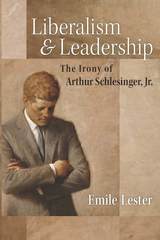
Most scholars and pundits today view Franklin Delano Roosevelt and John F. Kennedy as aggressive liberal leaders, while viewing Schlesinger’s famous histories of their presidencies as celebrations of their steadfast progressive leadership. A more careful reading of Schlesinger’s work demonstrates that he preferred an ironic political outlook emphasizing the virtues of restraint, patience, and discipline. For Schlesinger, Roosevelt and Kennedy were liberal heroes and models as much because they respected the constraints on their power and ideals as because they tested traditional institutions and redefined the boundaries of presidential power.
Aggressive liberalism involves the use of inspirational rhetoric and cunning political tactics to expand civil liberties and insure economic equality. Schlesinger’s emphasis on the crucial role that irony has played and should play in liberalism poses a challenge to the aggressive liberalism advocated by liberal activists, political thinkers, and pundits. That his counsel was grounded in conservative insights as well as liberal values makes it accessible to leaders across the political spectrum.
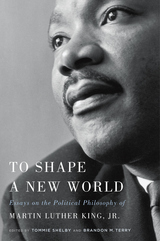
“Fascinating and instructive…King’s philosophy, speaking to us through the written word, may turn out to constitute his most enduring legacy.”
—Annette Gordon-Reed, New York Review of Books
Martin Luther King, Jr., is one of America’s most revered figures, yet despite his mythic stature, the significance of his political thought remains underappreciated. In this indispensable reappraisal, leading scholars—including Cornel West, Martha Nussbaum, and Danielle Allen—consider the substance of his lesser known writings on racism, economic inequality, virtue ethics, just-war theory, reparations, voting rights, civil disobedience, and social justice and find in them an array of compelling challenges to some of the most pressing political dilemmas of our time.
“King was not simply a compelling speaker, but a deeply philosophical intellectual…We still have much to learn from him.”
—Quartz
“A compelling work of philosophy, all the more so because it treats King seriously without inoculating him from the kind of critique important to both his theory and practice.”
—Los Angeles Review of Books
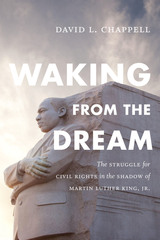
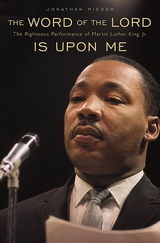

In 1952 Senator Joseph McCarthy included Zechariah Chafee’s name on a list of seven persons he called “dangerous to America.” How could this happen to a man whose life was filled with the quiet grace of achievement as a scholar of the law? In the first biography of this distinguished American, Donald Smith portrays Chafee as temperamentally conservative, only accidentally a defender of radicals and a civil rights advocate.
Chafee is most remembered for his contributions to First Amendment scholarship, including the classic Freedom of Speech, published in 1920 [and revised and republished in 1941 as Free Speech in the United States]. He publicly criticized the Justice Department prosecutions under the Espionage and Sedition Acts; appeared in court on behalf of Communists fighting deportation; and was president of a commission for the abolition of the death penalty. He served as vice chairman of the Commission on Freedom of the Press (the Hutchins Commission) and continued his public service when appointed to the United Nations Subcommission on Freedom of Information and of the Press.
Yet Chafee, who put his Harvard professorship in jeopardy more than once, never chose to be or perceived himself to be a controversial public figure. Preeminently a man of ideas, he spent most of his life teaching—at times applying both mathematical formulations and Greek philosophical theories to questions of law. This perceptive intellectual biography brings to life the story of a scholar caught up in the dramatic political events of his time.
READERS
Browse our collection.
PUBLISHERS
See BiblioVault's publisher services.
STUDENT SERVICES
Files for college accessibility offices.
UChicago Accessibility Resources
home | accessibility | search | about | contact us
BiblioVault ® 2001 - 2024
The University of Chicago Press









